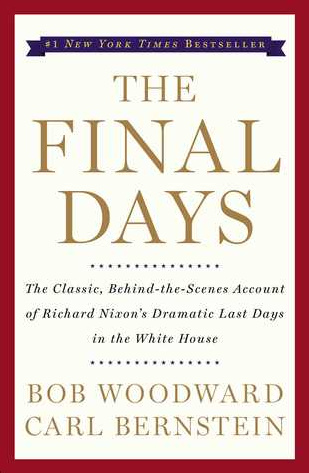

“The people of the United States are entitled to assume that their President is telling the truth. The pattern of misrepresentation and half-truths that emerges from our investigation reveals a presidential policy cynically based on the premise that the truth itself is negotiable.”
― Bob Woodward, quote from The Final Days
“Buzhardt was not sure, but he would check. He discerned that the President was extremely concerned about the gap, but there was something evasive in Nixon’s approach, something disturbing about his reaction. To Buzhardt, he seemed to be suggesting alternative explanations for the lawyer’s benefit, speculating on various excuses as if to say, “Well, couldn’t we go with one of those versions?” Buzhardt prided himself on being able to tell when the President was lying. Usually it wasn’t difficult. Nixon was perhaps the most transparent liar he had ever met. Almost invariably when the President lied, he would repeat himself, sometimes as often as three times—as if he were trying to convince himself. But this time Buzhardt couldn’t tell. One moment he thought Nixon was responsible, at another he suspected Woods. Maybe both of them had done it. One thing seemed fairly certain: it was no accident.”
― Bob Woodward, quote from The Final Days
“By late October, after Cox had been fired, Kissinger’s anxieties about the President had become more acute. “Sometimes I get worried,” he said. “The President is like a madman.” Kissinger was deeply pessimistic. He had looked to the second Nixon administration as a once-in-a-century opportunity to build a new American foreign policy, to achieve new international structures based on unquestioned American strength, détente with the Soviets and China, a closer bond with Europe. It seemed no longer possible. Watergate was shattering the illusion of American strength, he said, and with it American foreign policy.”
― Bob Woodward, quote from The Final Days
“their hearts in it. It was well”
― Bob Woodward, quote from The Final Days
“Why have the Soviets stood aside and allowed us to settle Berlin, Vietnam and the Middle East? One, because the United States is big, mean and tough as hell and they know it. Two, the obsession with peace in the USSR. Twenty million Russian people were killed during World War II. We must have the fear elements working, but also the hope element.”
― Bob Woodward, quote from The Final Days

“Elliot,” the President pleaded with him as the Attorney General entered, “Brezhnev wouldn’t understand if I didn’t fire Cox after all this.” Nixon urged Richardson to delay.”
― Bob Woodward, quote from The Final Days
“Always remember, others may hate you—but those who hate you don’t win unless you hate them, and then you destroy yourself.”
― Bob Woodward, quote from The Final Days
“For life is what animals can teach us: how the present moment is all, and past and future are illusion.”
― Alison Croggon, quote from The Crow
“He stayed close, and he stayed quiet. It was easy to do, almost; the silence above was so alarmingly complete that it was easier to keep it than to break it.”
― Cherie Priest, quote from Boneshaker
“Thanks a lot. You could have cut the girl some slack. We haven't had anything pretty to look at around here since Bradley's old golder retriever died died last fall.”
― Robyn Carr, quote from Virgin River
“Come find me," Leo put in, his gaze full of understanding. "Whenever you want. I'll be here.”
― Aimee Friedman, quote from Sea Change
“Posso querelare per diffamazione un tizio che mi accusa nero su bianco di avere picchiato mia moglie, di essere un plagiario, uno spacciatore, un alcolizzato con tendenze violente, e con tutta probabilità anche un assassino?"
"Non saprei. Mi sembra che il tizio sia piuttosto bene informato".”
― Mordecai Richler, quote from Barney's Version
BookQuoters is a community of passionate readers who enjoy sharing the most meaningful, memorable and interesting quotes from great books. As the world communicates more and more via texts, memes and sound bytes, short but profound quotes from books have become more relevant and important. For some of us a quote becomes a mantra, a goal or a philosophy by which we live. For all of us, quotes are a great way to remember a book and to carry with us the author’s best ideas.
We thoughtfully gather quotes from our favorite books, both classic and current, and choose the ones that are most thought-provoking. Each quote represents a book that is interesting, well written and has potential to enhance the reader’s life. We also accept submissions from our visitors and will select the quotes we feel are most appealing to the BookQuoters community.
Founded in 2023, BookQuoters has quickly become a large and vibrant community of people who share an affinity for books. Books are seen by some as a throwback to a previous world; conversely, gleaning the main ideas of a book via a quote or a quick summary is typical of the Information Age but is a habit disdained by some diehard readers. We feel that we have the best of both worlds at BookQuoters; we read books cover-to-cover but offer you some of the highlights. We hope you’ll join us.